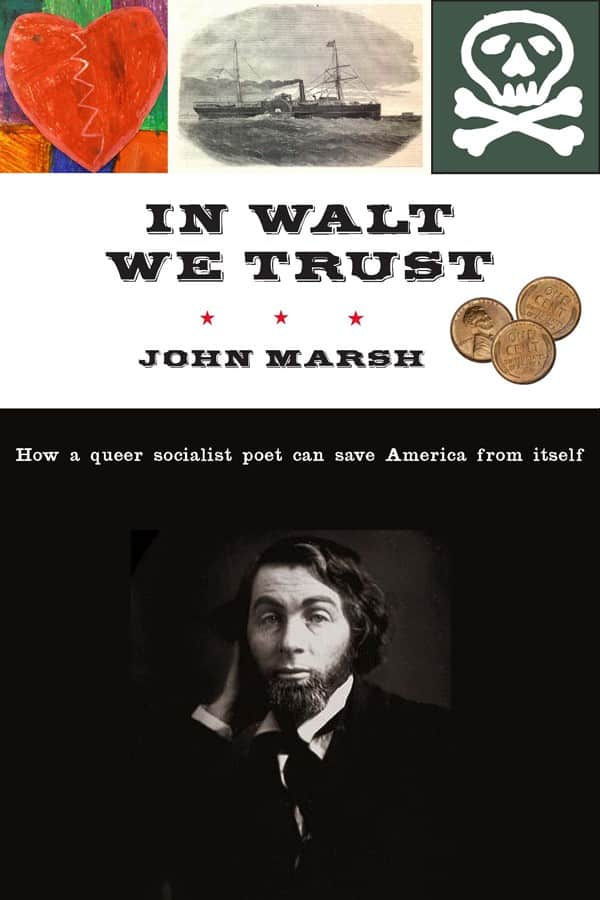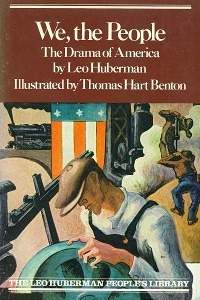In Walt We Trust: How a Queer Socialist Poet Can Save America from Itself
$21.00 – $25.00
Read an excerpt in UTNE Reader Online
Life in the United States today is shot through with uncertainty: about our jobs, our mortgaged houses, our retirement accounts, our health, our marriages, and the future that awaits our children. For many, our lives, public and private, have come to feel like the discomfort and unease you experience the day or two before you get really sick. Our life is a scratchy throat. John Marsh offers an unlikely remedy for this widespread malaise: the poetry of Walt Whitman. Mired in personal and political depression, Marsh turned to Whitman—and it saved his life. In Walt We Trust: How a Queer Socialist Poet Can Save America from Itself is a book about how Walt Whitman can save America’s life, too.
Marsh identifies four sources for our contemporary malaise (death, money, sex, democracy) and then looks to a particular Whitman poem for relief from it. He makes plain what, exactly, Whitman wrote and what he believed by showing how they emerged from Whitman’s life and times, and by recreating the places and incidents (crossing Brooklyn ferry, visiting wounded soldiers in hospitals) that inspired Whitman to write the poems. Whitman, Marsh argues, can show us how to die, how to accept and even celebrate our (relatively speaking) imminent death. Just as important, though, he can show us how to live: how to have better sex, what to do about money, and, best of all, how to survive our fetid democracy without coming away stinking ourselves. The result is a mix of biography, literary criticism, manifesto, and a kind of self-help you’re unlikely to encounter anywhere else.
Table of Contents
A Note on Editions of Whitman’s Poems
Introduction: Walt Whitman—A Poetic Comfort
1. Congratulations! You’re Dead!
2. Walt Whitman’s Credit Report Looks Even Worse than Yours
Interlude I: Was Walt Whitman Socialist?
3. With Walt Whitman, Making It Rain
Interlude II: Was Walt Whitman Gay?
4. Affection Shall Solve the Problems of Freedom
Conclusion: At Whitman’s Tomb
Notes
(Cover image of the 1848 Walt Whitman daguerreotype used courtesy of Walt Whitman House, Camden, NJ)
Percy Bysshe Shelley taught us that “Poets are the unacknowledged legislators of the world.” True enough. But Walt Whitman has always been more than an unacknowledged legislator. He has been and remains our unacknowledged founder. Born as Thomas Jefferson was fretting that the revolutionary “Spirit of 76” was being lost, Whitman grabbed the twin standards of enlightenment and possibility and carried them across the bridge from the days of Tom Paine to the present. His radical journey is our radical journey, and John Marsh captures the very essence of Whitman, and America, in this brilliant book.
—John Nichols, Washington correspondent for The Nation
Marsh shares his affection for Walt Whitman in this gentle, thoughtful consideration of the poet’s relevance to 21st-century America. Beset by moral malaise in his 30s, the author ‘suffered from fully-grown doubts, not just growing doubts, about the meaning of life and the purpose of our country.’ Whitman’s insights on death, money, sex and democracy buoyed his spirits…. Marsh confesses his love for the legendary poet, and by the end of this insightful homage, readers are likely to feel the same.
—Kirkus Reviews
Marsh rises to the challenge of surveying the broad banks of Whitman’s work…. Prophetic, timely, and not nearly as impractical as he may sometimes seem (though just as flighty), Whitman is to Marsh just as much a poet for his time as for ours—though we have the benefit of hindsight to adopt the wisdom of his foresight.
—Boston Globe
In Walt We Trust is one of the most engaged and engaging books on Whitman that I’ve read in many years. Marsh offers us a kind of autobiography of his years of reading Whitman, revealing at every turn just why it is that Whitman matters—why, in fact, reading him is a matter of life and death. Marsh takes us on a cultural journey from Jimmy Carter’s ‘malaise’ speech to the Occupy movement to a trip across the East River on the recently reopened Brooklyn ferry to a strip club in Pennsylvania to a drive through beleaguered Camden, New Jersey, and at each stop we are brought back to Whitman’s poetry in surprising, moving, and revelatory ways. Once every generation or so, we need a book like this one to remind us why, in the twenty-first century, it is still so essential to keep Whitman close at hand.
—Ed Folsom, Professor of English, The University of Iowa; editor, Walt Whitman Quarterly Review; co-director, Walt Whitman Archive
A beautiful, moving, and original book about our nation’s greatest poet.
—Mark Edmundson, University Professor, University of Virginia; author, Why Teach?
As soon as I read John Marsh’s claim early in this fine new book of popular criticism, that in reading Whitman he learned how to die, I became his appreciative audience. Marsh does not buy into the mushy transcendental side of Whitman’s notion that death avails not, but looks to the poet’s views on ownership and property to understand the transience of life and the meaning of coming face to face with death. Along with his treatment of shame and shamelessness in Whitman’s poetry of the body, the connection of the greed for property and the fear of death is one of several original touches in this personal and engaging book based mainly on close reading of Whitman’s poems and prose works placed alongside reflections on the state of contemporary America. Even if you do not buy into Marsh’s big idea that Whitman can save us all, you will find much to admire in this charming and intelligent book of essays on America’s foremost poet.
—Jimmie Killingsworth, Professor of English, Texas A&M University; author, Whitman’s Poetry of the Body and Walt Whitman and the Earth
An extraordinary and inherently fascinating read, “In Walt We Trust: How a Queer Socialist Poet Can Save America from Itself” is very highly recommended for community and academic library collections. As informed and informative as it is thoughtful and thought-provoking, “In Walt We Trust” is thoroughly ‘reader friendly from beginning to end.
—Midwest Book Review
John Marsh is associate professor of English at Pennsylvania State University. He is the author of two previous books: Class Dismissed: Why We Cannot Teach or Learn Our Way out of Inequality and Hog Butchers, Beggars, and Busboys: Poverty, Labor, and the Making of Modern American Poetry. Marsh is also the editor of You Work Tomorrow: An Anthology of American Labor Poetry, 1929-1941. He lives in State College, Pennsylvania, with his wife and daughter.
Publication Date: February 2015
Number of Pages: 256
Cloth ISBN: 9781583674758
eBook ISBN: 9781583674765
Related products
-
Monthly Review Volume 2, Number 10 (February 1951) [PDF]
$10.00 Add to cart -
Monthly Review Volume 2, Number 7 (November 1950) [PDF]
$10.00 Add to cart -
Monthly Review Volume 1, Number 9 (January 1950) [PDF]
$10.00 Add to cart -
Monthly Review Volume 1, Number 8 (December 1949) [PDF]
$10.00 Add to cart -
Monthly Review Volume 1, Number 4 (August 1949) [PDF]
$10.00 Add to cart -
We, the People: The Drama of America
$15.00 – $18.00 Select options This product has multiple variants. The options may be chosen on the product page

![Monthly Review Volume 2, Number 10 (February 1951) [PDF]](https://monthlyreview.org/wp-content/uploads/2015/09/Monthly Review Volume 2, Number 10 (February 1951) [PDF].jpg)
![Monthly Review Volume 2, Number 7 (November 1950) [PDF]](https://monthlyreview.org/wp-content/uploads/2015/09/Monthly Review Volume 2, Number 7 (November 1950) [PDF].jpg)
![Monthly Review Volume 1, Number 9 (January 1950) [PDF]](https://monthlyreview.org/wp-content/uploads/2015/09/Monthly Review Volume 1, Number 9 (January 1950) [PDF].jpg)
![Monthly Review Volume 1, Number 8 (December 1949) [PDF]](https://monthlyreview.org/wp-content/uploads/2015/09/Monthly Review Volume 1, Number 8 (December 1949) [PDF].jpg)
![Monthly Review Volume 1, Number 4 (August 1949) [PDF]](https://monthlyreview.org/wp-content/uploads/2015/09/Monthly Review Volume 1, Number 4 (August 1949) [PDF].jpg)
